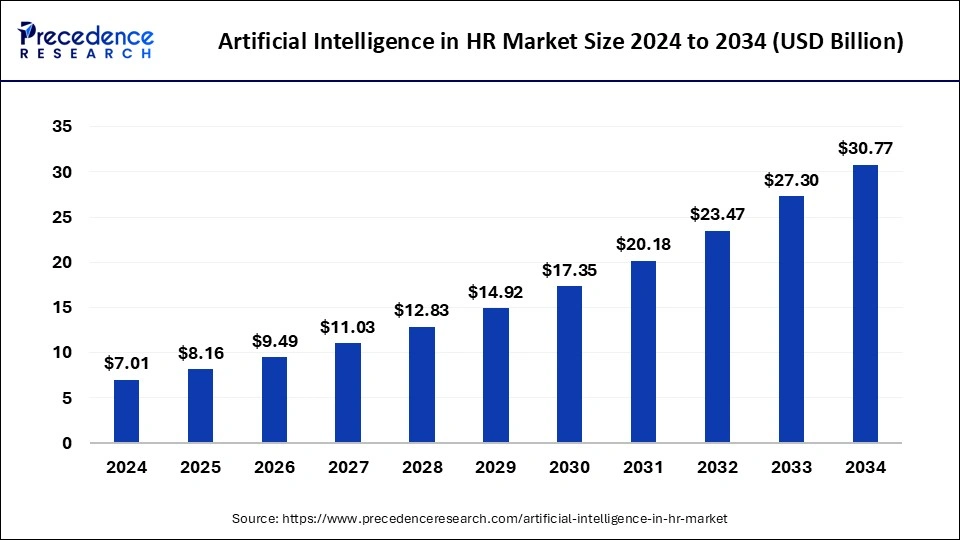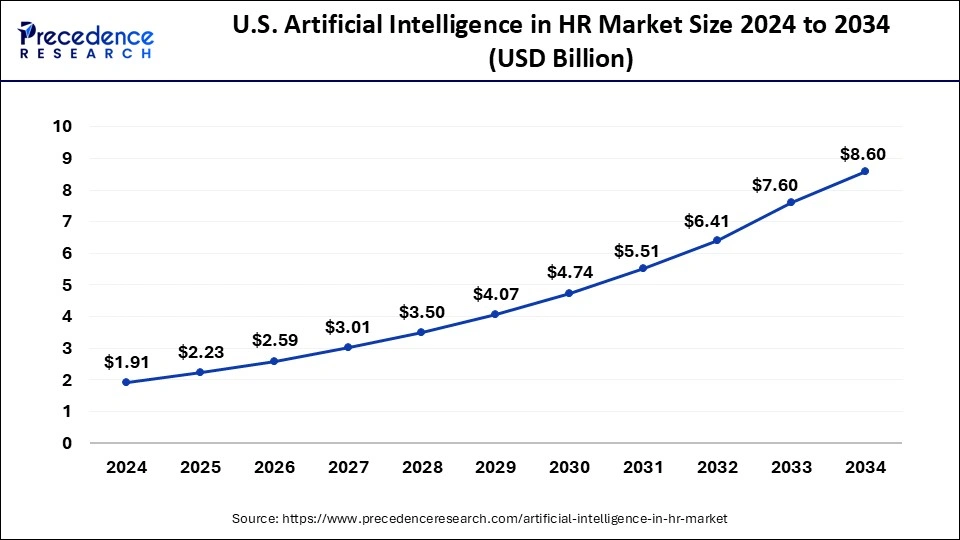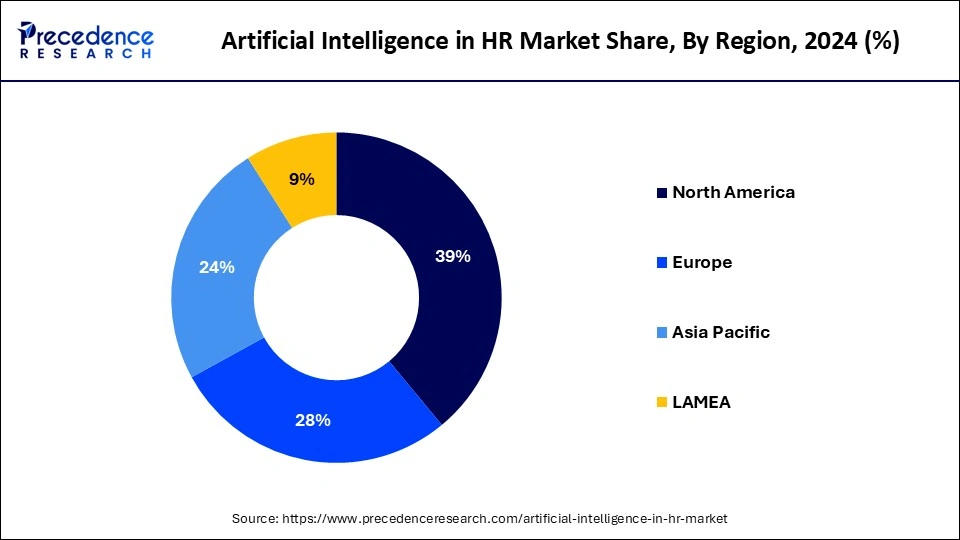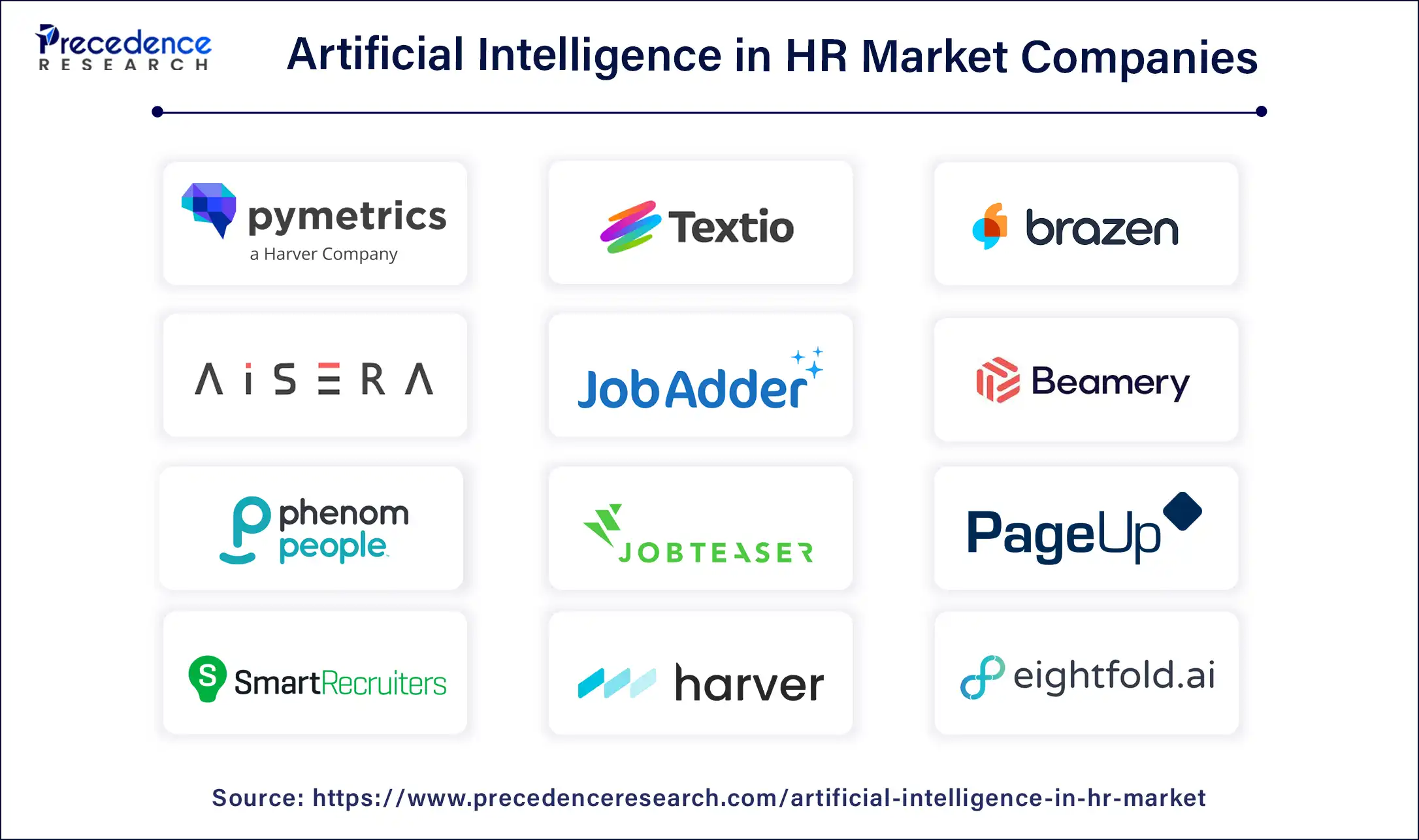Artificial Intelligence in HR Market Size and Forecast 2025 to 2034
The global artificial intelligence in HR market size was estimated at USD 7.01 billion in 2024 and is predicted to increase from USD 8.16 billion in 2025 to approximately USD 30.77 billion by 2034, expanding at a CAGR of 15.94% from 2025 to 2034. The artificial intelligence in HR market is driven by the growing interest in making decisions based on data in multiple firms, especially in developed countries.

Artificial Intelligence in HR Market Key Takeaways
- The global artificial intelligence in HR market was valued at USD 7.01 billion in 2024.
- It is projected to reach USD 30.77 billion by 2034.
- The artificial intelligence in HR market is expected to grow at a CAGR of 15.94% from 2025 to 2034.
- North America dominated artificial intelligence in HR market with largest revenue share of 39% in 2024.
- Asia- Pacific is the fastest growing in artificial intelligence in HR market during the forecast period.
- By component, the solution segment dominated the market with a 63.80% share in 2024.
- By component, the services segment is expected to grow at the fastest CAGR of 18.60% in 2024.
- By technology, the people analytics segment held a 21.70% market share in 2024.
- By technology, the metaverse-based tools segment is expected to grow at the highest CAGR of 21.30% over the forecast period.
- By deployment mode, the cloud-based segment led the market with 74.20% share in 2024 and is expected to grow at the highest CAGR of 17.90% over the forecast period.
- By enterprise size, the large enterprise segment dominated the market with a 68.90% share in 2024.
- By enterprise size, the SMEs segment is expected to grow at the highest CAGR of 18.80% during the forecast period.
- By application, the recruitment & talent acquisition segment held a 27.30% market share in 2024.
- By application, the learning & development segment is expected to grow at the highest CAGR of 20.40% in 2024.
- By end-use industry, the IT & telecom segment held a 22.10% market share in 2024.
- By end-use industry, the healthcare segment is expected to grow at the highest CAGR of 19.60% in 2024.
U.S. Artificial Intelligence in HR Market Size and Growth 2025 to 2034
The U.S. artificial intelligence in HR market size was valued at USD 1.91 billion in 2024 and is expected to be worth around USD 8.60 billion by 2034 with a CAGR of 16.24% from 2025 to 2034.

North America dominated the artificial intelligence in HR market in 2024. AI businesses are financed by a thriving venture capital ecosystem in North America, especially in the United States. AI businesses specializing in HR solutions have received significant investment from Sequoia Capital, Andreessen Horowitz, and Accel Partners. Federal and state governments encourage innovation in the HR industry by offering grants and subsidies for AI research and businesses.

Asia- Pacific is observed to be the fastest growing in the artificial intelligence in HR market during the forecast period. Asia-Pacific nations boast some of the world's largest populations, contributing to a diverse labor force. Sophisticated HR solutions are needed to manage this workforce effectively. AI solutions assist local businesses in effectively managing personnel acquisition, employee engagement, and retention. These solutions offer data-driven insights, predictive analytics, and tailored experiences to manage massive amounts of HR data.
Market Overview
In the HR industry, artificial intelligence (AI) refers to the application of AI technology to human resources operations to improve and expedite workforce management, recruitment, employee engagement, training, and performance evaluation procedures. Artificial intelligence (AI) may automate tedious processes like resume screening, allowing HR personnel to concentrate on key projects. This efficiency might result in significant cost reductions in hiring procedures and day-to-day HR duties. AI in HR can support fairness and diversity in hiring and performance reviews by standardizing candidate evaluation criteria and reducing human bias in decision-making processes.
Artificial Intelligence in HR Market Growth Factors
- AI frees HR staff to focus on strategic work by automating processes like scheduling and resume screening.
- AI can improve employee experience, tailor career development, and enhance well-being programs. This is the driving factor for the growth of artificial intelligence in HR market.
- AI can lessen the danger of hiring bias and help guarantee compliance with labor rules.
- AI facilitates the identification of suitable applicants, enhances the hiring procedure, and customizes the work environment.
- HR can use a wealth of data to inform better hiring, training, and retention decisions.
Market Scope
| Report Coverage | Details |
| Market Size by 2034 | USD 30.77 Billion |
| Market Size in 2025 | USD 8.16 Billion |
| Growth Rate from 2025 to 2034 | CAGR of 15.94% |
| Largest Market | North America |
| Base Year | 2024 |
| Forecast Period | 2025 to 2034 |
| Segments Covered | Offering,Technology, Enterprise Size, Application, Industry, and Regions |
| Regions Covered | North America, Europe, Asia-Pacific, Latin America, and Middle East & Africa |
Market Dynamics
Driver
Enhanced recruitment processes
AI-powered hiring procedures can improve candidates' experiences by responding more quickly, facilitating individualized conversations, and maintaining constant contact throughout the hiring process. Artificial intelligence (AI)-powered chatbots can quickly and effectively respond to candidate inquiries, guaranteeing a seamless and satisfying experience essential for company branding. AI dramatically lowers hiring expenses by increasing productivity and automating monotonous jobs. Businesses can allocate resources more efficiently by concentrating on the strategic elements of hiring and employee engagement instead of administrative duties.
Restraint
Cost of implementation
For AI systems to work well, a strong infrastructure is needed. This could entail modernizing networking infrastructure, servers, and storage systems to meet the processing demands of artificial intelligence algorithms. It could be difficult for small to mid-sized businesses to justify or finance these infrastructural expenditures. Implementing AI carries some inherent risks, like the possibility of algorithm biases, data breaches, or problems with regulatory compliance. The entire cost of AI adoption in HR is increased by the need to spend on cybersecurity safeguards, auditing procedures, and legal advice to mitigate these risks. This limits the growth of artificial intelligence in HR market.
Opportunities
Automation of routine tasks
AI systems can forecast future patterns in employee engagement, performance, and attrition using historical data. HR departments can improve organizational stability and retain top people by taking proactive initiatives to anticipate possible issues before they arise. AI may help with administrative duties including payroll processing, benefits administration, compliance monitoring, recruiting, and talent management. While these tasks are vital, they are frequently resource-intensive; automation lowers errors and frees HR specialists to work on more important tasks.
Improved employee engagement
AI can analyze enormous volumes of employee data to comprehend work habits, career goals, and personal preferences. This enables HR departments to better fit everyone with experiences like job assignments, career growth pathways, and training programs. Artificial Intelligence improves employee engagement and happiness by personalizing these experiences. This opens an opportunity for the rise of artificial intelligence in HR market.
Offering Insights
The services segment held the significant share of the artificial intelligence in HR market in 2024.HR AI has an enormous effect on an organization's strategy. Service providers provide consulting services to assist firms in creating and implementing a strategy plan for the use of AI in HR. A change in organizational culture is necessary to incorporate AI in HR. Service providers aid with change management, guiding businesses through the shift and winning over stakeholders. AI-powered HR solutions must expand to accommodate the company's expansion. Service providers guarantee long-term viability and efficacy by providing scalable solutions that can expand with the company.
Technology Insights
The people analytics segment held a 21.70% market share in 2024. The dominance of the segment can be linked to the rising demand for data-driven decision-making along with the growing need for enhanced employee experiences. Also, AI-powered tools provide key insights into workforce trends, allowing HR professionals to boost workforce planning.
The metaverse-based tools segment is expected to grow at the highest CAGR of 21.30% over the forecast period. The growth of the segment can be driven by improved employee experience, increased efficiency, and enhanced data-driven decision-making. Furthermore, Metaverse-based tools can enhance accessibility for employees with disabilities or those remotely working.
Enterprise Size Insights
The large enterprise segment dominated the market with a 68.90% share in 2024. Regarding financial resources, large companies have a lot more than small and medium-sized businesses (SMBs). Their strong financial position enables them to invest significantly in AI technology, such as advanced HR software. They can cover the initial expenditures of implementing AI systems and continuing maintenance, updates, and training charges. Over time, these investments strengthen their capacity to save operating expenses, increase efficiency, and streamline HR procedures. Large businesses place a high premium on improving the employee experience.
The SMEs segment is expected to grow at the highest CAGR of 18.80% during the forecast period. The growth of the segment is due to the growing need for efficient recruitment, coupled with the data-driven insights for better data management. The growing affordability and availability of AI solutions make it easier for SMEs to integrate AI into their HR processes.
Application Insights
The recruitment & talent acquisition segment held a 27.30% market share in 2024. Recruiters can spend less time assessing resumes by using AI solutions to automate this process. Natural language processing (NLP) is a technique automated systems use to comprehend and assess resumes to select the best applicants for additional review. Using predictive analytics, artificial intelligence (AI) tools evaluate candidates' probable future performance and cultural fit with the organization. This leads to greater workforce quality overall and increased retention rates by assisting recruiters in making more educated judgments.
The learning & development segment is expected to grow at the highest CAGR of 20.40% in 2024. The dominance of the segment can be attributed to its ability to customize learning experiences and automate whole processes. By analysing a vast amount of data, AI can identify individual learning needs and preferences, optimizing the creation of individualized learning paths and content.
End-use Industry Insights
The IT & telecom segment held a 22.10% market share in 2024. With AI-powered recruitment tools, these businesses can effectively sort through many applications, find the best candidates using machine learning and predictive analytics solutions, gain insight into employee engagement and satisfaction, and proactively address issues that may cause turnover. AI technologies may expand as a firm grows, effectively managing growing quantities of HR activities. AI-driven HR solutions can be customized to handle problems unique to a certain business, such as overseeing distant workers or guaranteeing adherence to international legal requirements.
The healthcare segment is expected to grow at the highest CAGR of 19.60% in 2024. The dominance of the segment can be credited to the surge in healthcare costs and growing demand for efficient workforce management. Moreover, AI-powered solutions optimise scheduling, streamline recruitment, and improve the overall training process.
Component Insights
The solution segment dominated the market with a 63.80% share in 2024. The dominance of the segment can be attributed to the rising demand for automation and individualized employee experiences. The solution segment encompasses platforms and software that combine AI for HR tasks.AI algorithms process historical data to predict future workforce needs, making strategic decisions swift.
The services segment is expected to grow at the fastest CAGR of 18.60% in 2024. HR AI has an enormous effect on an organization's strategy. Service providers provide consulting services to assist firms in creating and implementing a strategy plan for the use of AI in HR. A change in organizational culture is necessary to incorporate AI in HR. Service providers aid with change management, guiding businesses through the shift and winning over stakeholders.
Deployment Mode Insights
The cloud-based segment led the market with 74.20% share in 2024 and is expected to grow at the highest CAGR of 17.90% over the forecast period. The growth and dominance of the segment can be credited to the growing demand for efficient talent acquisition in various sectors. Cloud-based solutions provide flexibility, scalability, and cost-effectiveness, which makes them attractive to organizations of all sizes.
Artificial Intelligence in HR Market Companies

- IBM Corporation
- Oracle Corporation
- SAP SE
- Automatic Data Processing Inc
- Cegid Group
- Cornerstone OnDemand Inc
- Job Teaser
- Phenom People Inc
- Eightfold AI
- Simpplr
- Beamery Inc
- HireVue Inc
- Jobvite Inc
- EdCast Inc
- Harver B.V.
- Smart Recruiters
- Gloat
- Textio
- Cezanne HR Limited
- Brazen Technologies Inc.
- Pymetrics Inc
- Aisera
- PageUp People Pty
- JobAdder Operations Pty Ltd
- Entelo Inc
Recent Developments
In May 2023, With the recent announcement of SAP and Microsoft's extended relationship, the dream of enterprise-ready generative AI that can improve worker productivity and development is becoming closer to reality. By combining SAP SuccessFactors solutions with Copilot in Viva Learning and Microsoft 365 Copilot, enterprises will be able to better retain, upskill, and hire workers to close skills shortages.
Segments Covered in the Report
By Offering
- Solutions
- Software Platforms
- Virtual Assistants
- Chatbots (AI-powered screening/interviewing)
- Analytics Tools
- Other solutions
- Services
- Implementation Services
- Consulting Services
- Training & Support Services
By Technology/Product Type
- Virtual Assistants
- Metaverse-based tools
- AI-powered Chatbots
- People Analytics
- Machine Learning
- Computer Vision
- Natural Language Processing (NLP)
- Others (e.g., RPA)
By Deployment Mode
- Cloud-based
- On-premise
By Enterprise Size
- Large Enterprise
- SMEs
By Application
- Recruitment & Talent Acquisition
- Employee Onboarding & Engagement
- Performance Management
- Workforce/Talent Management
- Payroll Processing
- Learning & Development
- Employee Record Management
- Others (e.g., compliance, benefits)
By End-use Industry
- IT & Telecom
- BFSI (incl. financial compliance)
- Healthcare
- Education
- Manufacturing
- Retail & eCommerce
- Government
- Other industries
By Geography
- North America
- Europe
- Asia Pacific
- Latin America
- Middle East and Africa
For inquiries regarding discounts, bulk purchases, or customization requests, please contact us at sales@precedenceresearch.com
Frequently Asked Questions
Ask For Sample
No cookie-cutter, only authentic analysis – take the 1st step to become a Precedence Research client
 Get a Sample
Get a Sample
 Table Of Content
Table Of Content
 sales@precedenceresearch.com
sales@precedenceresearch.com
 +1 804-441-9344
+1 804-441-9344
 Schedule a Meeting
Schedule a Meeting